
Alexander Heinle
Alex is a marketer at Zavvy. On this blog, he mainly shares insights gained from discussions with selected experts and from helping our customers set up and improve their onboarding or learning programs.

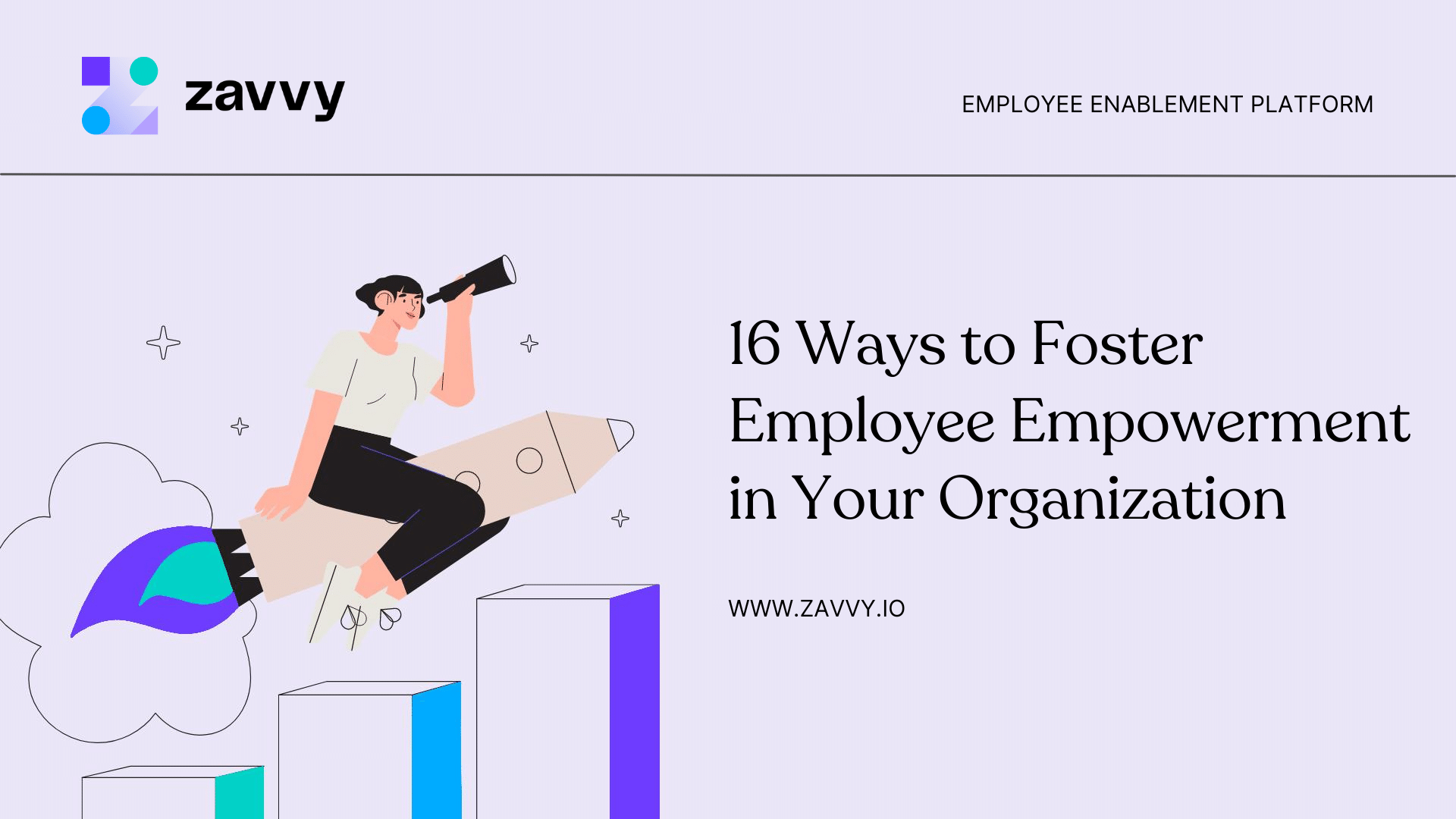
"Train people well enough so they can leave. Treat them well enough, so they don't have to."
- Sir Richard Branson
Research shows that only 29% of employees feel satisfied and engaged by their employers. Engaged employees are more likely to be productive and committed to an organization. Yet, many companies fail to understand the importance of employee engagement and its influence on productivity.
Fortunately, there's a foolproof solution to this challenge: Employee Empowerment.
Join us as we dissect employee empowerment, its benefits, and the ways you can achieve it in your workplace.
Together with our curators, we have created a library of actionable digital marketing resources. Personalized to your team's needs.
Employee empowerment means that companies give their staff more (or complete) authority over work processes. It emphasizes self-reliance and independence among employees by providing the required resources to achieve their full potential.
Power shifts from the company/manager to the people.
Employee empowerment requires a high level of trust between staff and their managers to succeed. As a result, employers must cultivate a positive working environment for trust to develop.
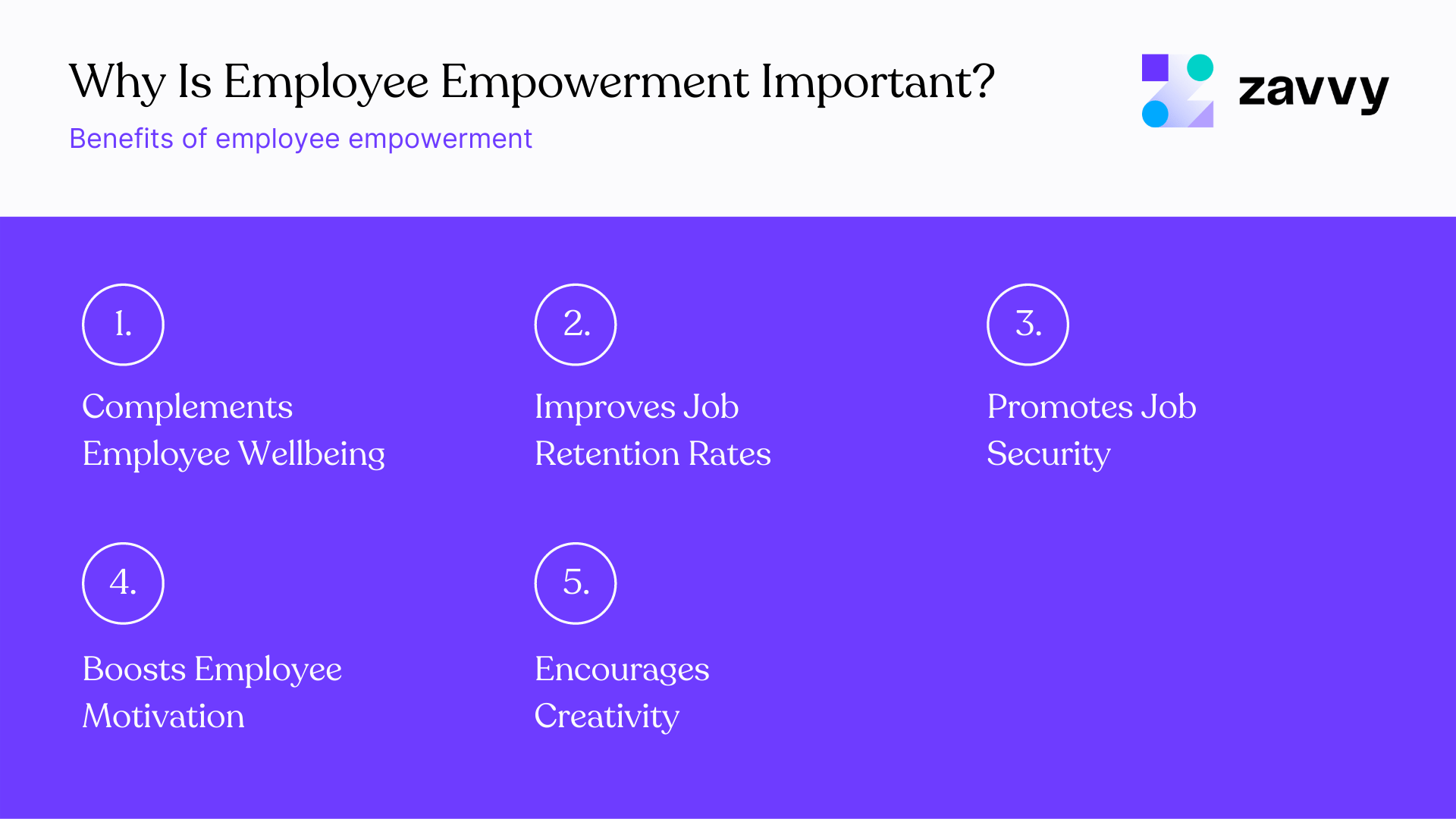
Employee empowerment typically leads to better well-being among workers.
Here's why: Giving staff autonomy and independence at the workplace leads to better engagement levels: People feel more fulfilled, more responsible, free in their decisions, and hence happier.
Empowering employees is among the top contributors to high job retention rates. People are less likely to quit when given autonomy and independence. You reinforce their confidence in their abilities when you allow them to lead projects.
It also shows you value and trust their judgment. As a result, employees feel motivated to continue working at your organization.
Employee empowerment is a huge source of motivation. People are more inclined to participate actively and contribute to work when they have autonomy. You not only boost their incentive to be productive, but you reinforce vital qualities such as self-reliance.
Empowering your employees promotes job security by providing learning and development opportunities. These pieces of training teach them new skills while sharpening the old ones. Consequently, employees gain the upper hand over their counterparts in the industry.
Empowered employees typically feel motivated to tap into their creativity when devising organizational strategies. They also get the chance to hone other skills such as problem-solving and critical thinking.
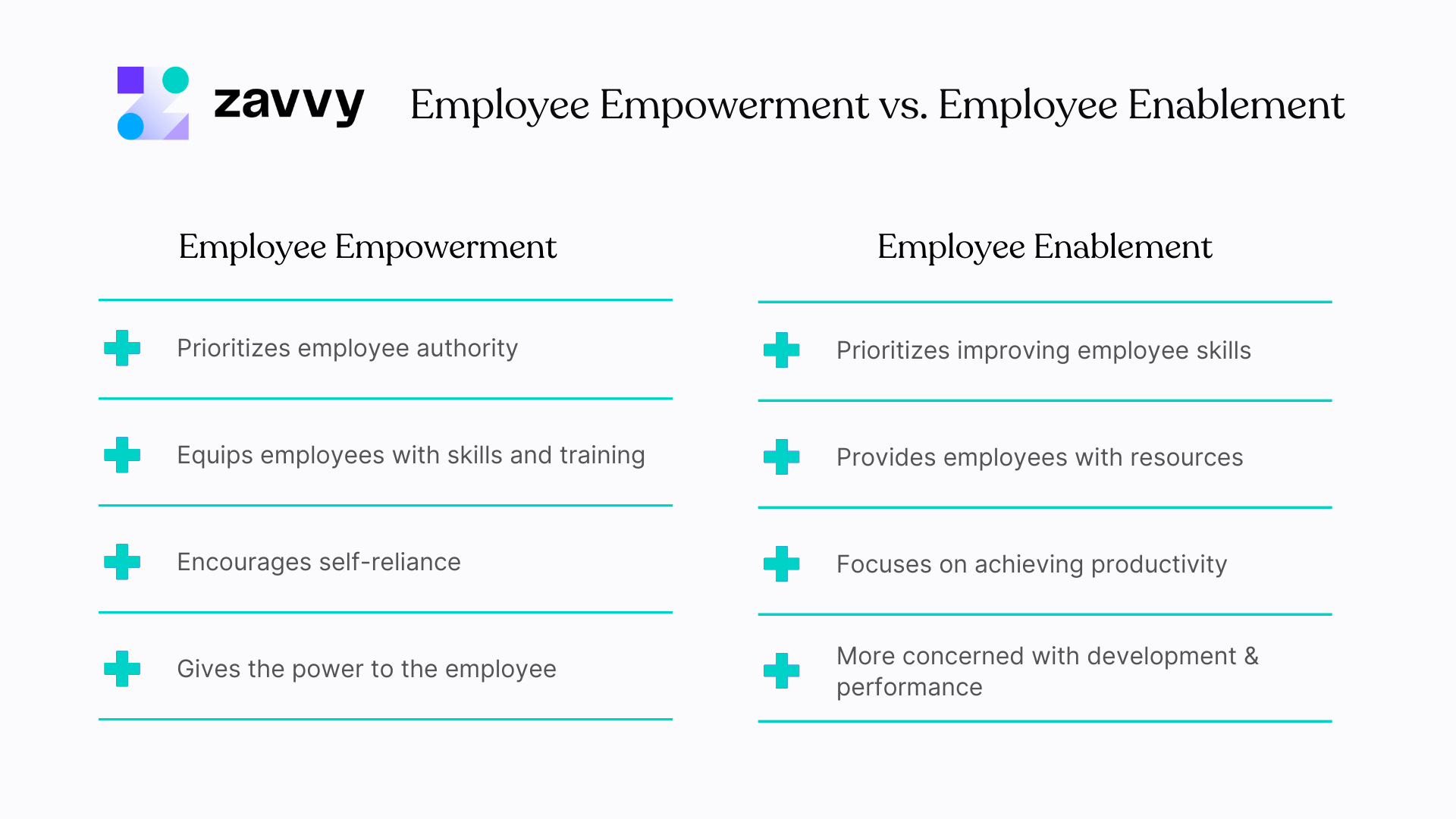
An empowered organization typically delegates power to all its employees. All businesses have a hierarchy model that details the distribution of power. Managers and higher-ups are usually at the top of the distribution chain in traditional companies.
An empowered organization dismantles this conventional arrangement in favor of a flatter hierarchy. In other words, it distributes autonomy from executives to employees.
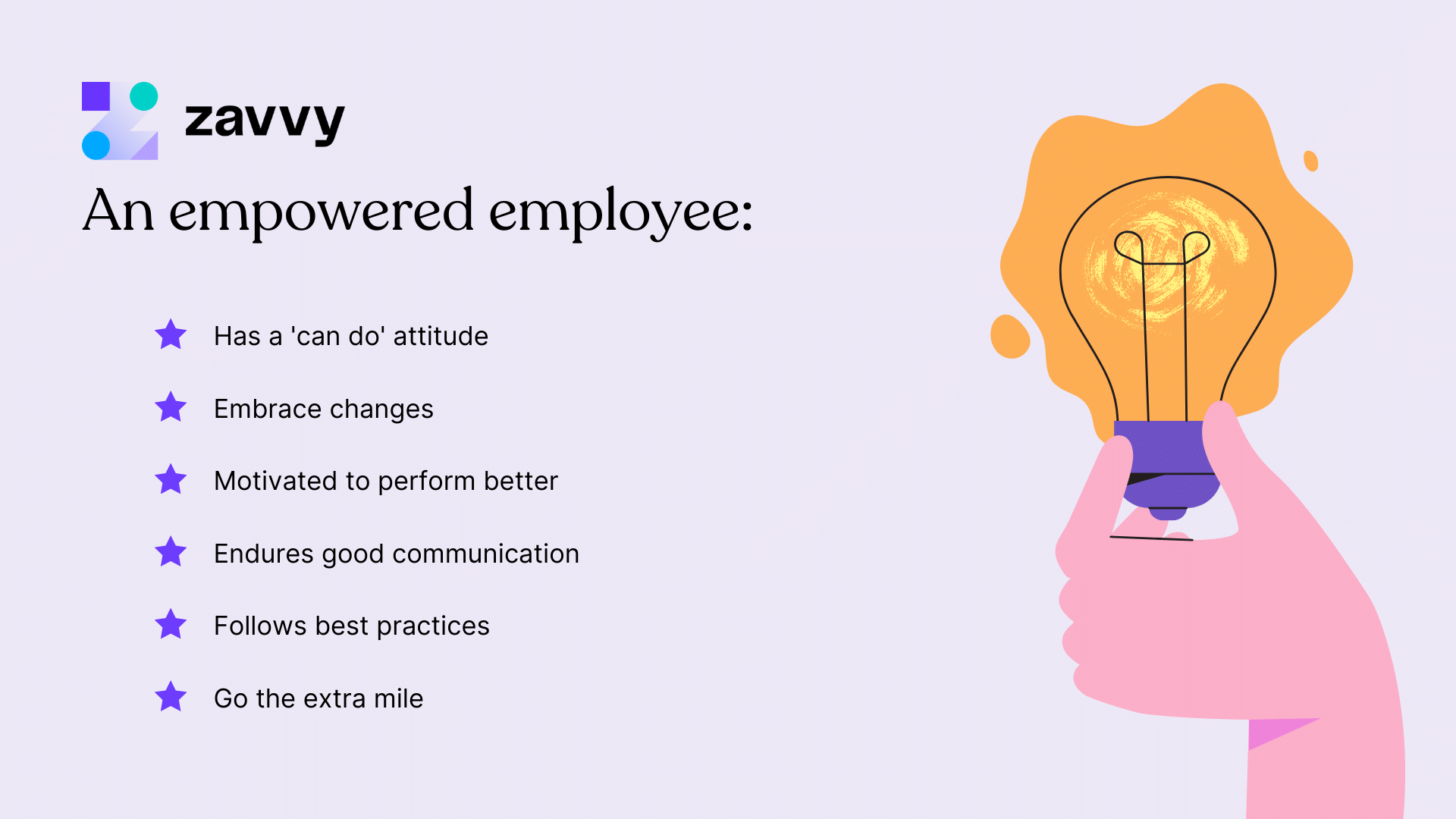
That's not all; an empowered organization also prioritizes self-improvement, career growth, and development.
Lastly, they typically value positive work culture through strong values such as teamwork and collaboration.
Delegating works by assigning roles according to one's strengths or best qualities.
Obvious example: If your employee Mark is extremely good at mobilizing people towards a cause, the best role would be a coordinator or team leader. Similarly, if Anne is great at expressing herself artistically, she'd be best suited in the graphics department.
Proper delegation is one of the most central steps towards achieving true empowerment.
Employers can enrich jobs by giving their employees more independence and authority over creative processes. The best way to do so is by giving them the reigns to make decisions independently.
Another way you can achieve job enrichment is by allowing employees to diversify work processes. For example, instead of going down to the basement to photocopy documents, you can distribute copy machines to all departments.
Employees need to know how to relate with one another. The best way to do this is by setting up an internal networking program where they can connect. It's also a great way to engage remote employees.
Working from home tends to make people feel alienated from the rest of the staff. However, with an internal networking program in place, they can connect and chat with their colleagues outside of work.
A proper development framework lays the foundation for self-directed, ongoing growth.
To get there, it makes sense to
Be sure to motivate everyone along the way and truly live continuous learning. In the end, culture wins.
You can attain employee empowerment by offering them learning and development opportunities. It's an essential part of any organization because:
Recognize whenever your employees perform accordingly, e.g., by meeting set targets.
Recognition is a huge motivating factor in any business. It makes people feel valued and appreciated for their efforts.
As a result, employees renew their drive to perform and improve productivity. Moreover, recognition improves employee engagement which promotes job satisfaction. When workers are satisfied with their jobs, they're more likely to stay in the company.
Studies in psychology show that rewards have a lasting positive impact on the recipient.
The same principle applies in the workplace. You can promote employee empowerment by giving your staff rewards for good performance. Examples of such tokens of appreciation include:
Allow your employees to brainstorm new ideas and solutions on their own. There's nothing more annoying than a boss who constantly micromanages their workers.
In fact, micromanaging has been proven to be incredibly detrimental to workflow.
Here's how:
Employee autonomy is an essential quality in any workplace. It increases self-reliance and grows vital skills such as critical and creative thinking. It also refines your employees' problem-solving skills.
Rules exist not to control people but to create uniformity and streamline processes. This principle also applies in the corporate space. Employers need to have clear and comprehensive guidelines for their employees.
These rules provide a framework for all work processes, such as goal setting and budget allocation. They ensure everyone treats each other equally and respectfully.
In addition to setting the foundation for work relations, rules also create room for teamwork and collaboration.
Lastly, guidelines grow the workplace culture by promoting values such as accountability and transparency. You can hold employees responsible for their actions in case they violate these rules.
Think of peer-mentoring or coaching as an investment in your employees. By improving and teaching them additional skills, everyone benefits. There are several types of coaching such as:
Coaching is instrumental to achieving employee empowerment:
Feedback is essential to any business. Your employees deserve to be seen and heard. It shows you value them beyond the labor they provide every day. So be receptive to new ideas and encourage staff to give their opinions and suggestions.
A great way you can encourage feedback is by:
Most people would be scared to make mistakes. However, any healthy, well-adjusted person knows that they are critical to the learning experience. So, don't be so hard on your employees when they make errors.
To err is human, to forgive divine.
-Alexander Pope.
Encourage them to learn from their mistakes.
However, that doesn't mean you should allow your employees to be reckless. Instead, allow them to troubleshoot and devise solutions independently but help when necessary.
Let them consult with their peers and coworkers. After all, a problem shared is a problem solved. That way, they develop their critical thinking skills while encouraging autonomy and teamwork.
This leadership style focuses on motivating employees to be innovative and find solutions. Typical characteristics include:
Transformational leadership has several benefits such as:
Examples of transformational leaders include Jeff Bezos of Amazon and Steve Jobs of Apple.
Clear communication channels are a vital component of employee empowerment. Here's why:
Below are some ways you can improve communication channels in your company:
Empathy is a core component of any workplace's values. We develop empathy when we interact and share our stories. In addition, companies can foster empathy by organizing team activities such as retreats and picnics.
You can also hold these events virtually to accommodate everyone, including your remote workers. One other way you can develop empathy is by improving communication channels. Provide multiple methods beyond email, such as Slack Messaging.
Be open to new ideas. Since the onset of the pandemic, companies, and businesses have been forced to adopt new and improved strategies. Before, work was limited to the office, and few companies used remote or hybrid work.
Fast forward to present times, more and more businesses are leaning towards these flexible arrangements. Studies show that working from home can increase productivity because it eliminates the hassle of the commute home.
The average person uses roughly an hour to travel to and from work. However, with remote working arrangements, workers get to spend that extra hour being productive.
At Disney, the goal is to make sure everyone is "the right person" to talk about something when it comes up.
An essential requirement here is thorough customer service training: Everybody learns how to deliver the same, high customer experience.

Airbnb promotes employee empowerment by prioritizing autonomy.
The company places its workers into teams, encouraging collaboration and friendly work relations. It also delegates roles to workers according to strengths, thereby instilling confidence and self-reliance.
Southwest Airlines is consistently ranked higher for both employee happiness and customer satisfaction.
A key reason for that is their strong focus on employees. As a vital touchpoint with customers, employees make or break a customer experience.
They are not only trained to make proactive decisions and take responsibility - but they also participate in company-wide decisions like the design of new uniforms.
Netflix is known for having an innovative culture where employees are encouraged to experiment and think outside the box. In fact, Netflix believes in fostering freedom and responsibility so much so that it has an entire slide deck dedicated to the topic. One key theme? "Encourage independent decision-making by employees."
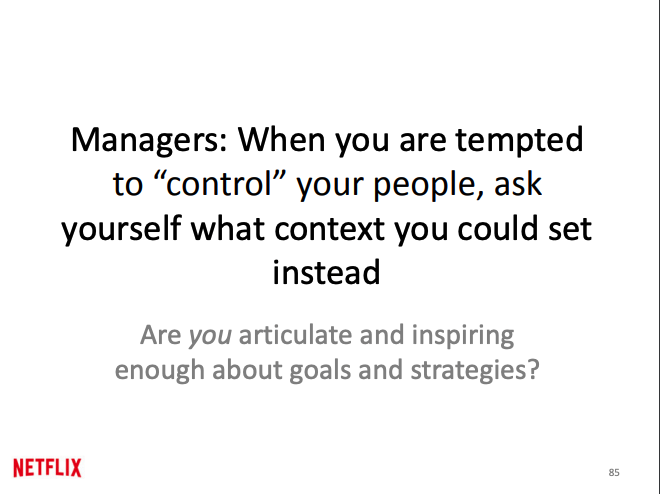
"The responsibility of a company is to serve the customer. The responsibility of leadership is to serve their people so that their people may better serve the customer. If leaders fail to serve their people first, both customer and company will suffer."
- Simon Sinek - Motivational Speaker
Employee empowerment is vital for maintaining a happy and satisfied workforce. There are several ways you can decentralize power from the executives to your employees.
First and foremost, that is by encouraging autonomy.
Allow people to head their own projects. Give them decision-making control, which breeds trust between staff and management. Ultimately, it's a win-win for both parties.
Next, embrace flexibility by trying out different work processes. Another great way to achieve employee empowerment is by delegating duties according to strengths. It boosts your employees' confidence and reaffirms their independence.
It doesn't end with giving people autonomy and hoping they'll do well. They still need to be coached and supported in their development. Lay the foundation for an empowered workforce with our development solution.
>> Read Next: What is Employee Enablement - And how to embrace it? <<
Upskill your team every week with the best contents and personalized recommendations.

"Train people well enough so they can leave. Treat them well enough, so they don't have to."
- Sir Richard Branson
Research shows that only 29% of employees feel satisfied and engaged by their employers. Engaged employees are more likely to be productive and committed to an organization. Yet, many companies fail to understand the importance of employee engagement and its influence on productivity.
Fortunately, there's a foolproof solution to this challenge: Employee Empowerment.
Join us as we dissect employee empowerment, its benefits, and the ways you can achieve it in your workplace.
Get a demo!
We'll be happy to show you around and answer all your questions.
Trusted by innovative companies



We'll be happy to show you around, answer your questions, or arrange a free trial.
Erhalten Sie eine kostenlose Demo unserer Onboarding-Software.
Vertraut von



Your Training & Development Strategy - Solved in 1 Tool.
Trusted by innovative companies



We'll be happy to show you around, answer your questions, or arrange a free trial.
Learn how Zavvy helps you drive performance, development, and engagement.
Trusted by innovative companies



We'll be happy to show you around, answer your questions, or arrange a free trial.
We'll be happy to show you around and answer all your questions.
Trusted by innovative companies



We'll be happy to show you around, answer your questions, or arrange a free trial.
Gerne zeigen wir Ihnen ganz unverbindlich unsere Plattform im Detail.
Vertraut von modernen Unternehmen



Get a demo!
We'll be happy to show you around and answer all your questions.
Trusted by innovative companies



We'll be happy to show you around, answer your questions, or arrange a free trial.
Erhalten Sie eine kostenlose Demo unserer Software für Mitarbeiterenwicklung und Training.
Moderne Unternehmen
setzen auf Zavvy


